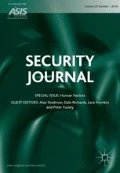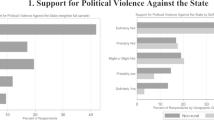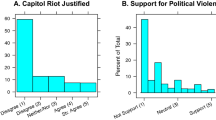Abstract
This study analyzed the perceptions of Nigerians as regards the underlying causes of violent extremism, the government responses, and possible solutions to this problem. The study aimed to fill this gap in the literature by specifically analyzing the influence of different social identities on the perceptions of violent extremism as well as counterterrorism efforts using nationally representative data (N = 1600). The research findings indicated that there are significant differences between the perceptions of religious, ethnic, and regional groups on violent extremism in Nigeria. While Christians and respondents of the Igbo ethnicity see religious belief as one of the main three reasons to join extremist groups, Muslims and respondents from the Hausa-Fulani ethnicity mostly see unemployment and poverty as the main reasons to join extremist groups. Moreover, Christians, respondents from the South, and the Igbo ethnicity tended to find the Nigerian government efforts to address the problem of extremist groups less effective than Muslims, respondents from the North, and the Hausa-Fulani and Yoruba ethnicities. Differences among the ethnicities, between religious groups and between the regions, are very clear and significant on these issues. However, both Christians and Muslims see improving the economy and creating more jobs as one of the best ways for the government to deal with the problem of violent extremism and their responses to other suggested ways of combating violence do not differ significantly. Counterterrorism and counter-radicalization efforts should consider these differences and similarities in efforts to successfully craft effective policies against violent extremism in Nigeria.










Similar content being viewed by others
Notes
a: Variables are measured at the nominal level, b: The levels of the variables are mutually exclusive, c: Assumption of the independence of the observation is met, d: the expected value of the number of sample observations in each level of the variable is at least 5.
a: The independent variable consisted of three or more categorical groups, b: The assumption of the independence of the observations was met, c: The dependent variable was an ordinal variable, d: The shape of the distribution of the dependent variable by independent groups was similar.
References
Adegbulu, Femi. 2013. Boko Haram: The emergence of a terrorist sect in Nigeria 2009–2013. African Identities 11 (3): 260–273.
Adegbulu, Femi. 2013. Boko Haram: The emergence of a terrorist sect in Nigeria 2009–2013. African Identities 11 (3): 271
Adelaja, Adesoji O., Abdullahi Labo, and Eva Penar. 2018. Public opinion on the root causes of terrorism and objectives of terrorists: A Boko Haram case study. Perspectives on Terrorism 12 (3): 35–49.
Adelaja, Adesoji O., Abdullahi Labo, and Eva Penar. 2018. Public opinion on the root causes of terrorism and objectives of terrorists: A Boko Haram case study. Perspectives on Terrorism 12 (3): 40.
Afrobarometer Data can be accessible at http://afrobarometer.org/data.
Agbiboa, Daniel E., and Benjamin Maiangwa. 2014. Nigeria United in grief; divided in response: Religious terrorism, Boko Haram, and the dynamics of state response. African Journal on Conflict Resolution 14 (1): 63–97.
Aghedo, Iro. 2014. Old wine in a new bottle: Ideological and operational linkages between Maitatsine and Boko Haram revolts in Nigeria. African Security 7 (4): 229–250.
Aghedo, Iro. 2014. Old wine in a new bottle: Ideological and operational linkages between Maitatsine and Boko Haram revolts in Nigeria. African Security 7 (4): 233
Aghedo, Iro, and Oarhe Osumah. 2012. The Boko Haram uprising: How should Nigeria respond? Third World Quarterly 33 (5): 853–869.
Alao, Abiodun. 2013. Islamic radicalisation and violent extremism in Nigeria. Conflict, Security & Development 13 (2): 127–147.
Alao, Abiodun. 2013. Islamic radicalisation and violent extremism in Nigeria. Conflict, Security & Development 13 (2): 132
Botha Anneli and Mahdi Abdile 2019. Reality versus perception: toward understanding Boko Haram in Nigeria. Studies in Conflict & Terrorism, 42 (5) : 493–519.
Brechenmacher, Saskia. 2019. Stabilizing Northeast Nigeria after Boko Haram. Carnegie Endowment for International Peace
Campbell, John, and Asch Harwood. 2018. “Boko Haram’s Deadly Impact” 20 August 2018. https://www.cfr.org/article/boko-harams-deadly-impact#:~:text=Seven%20Years%20of%20Violence,which%2034%2C261%20people%20were%20killed.
Virginia Comolli. 2015. Boko Haram: Nigeria’s Islamist insurgency. Oxford University Press.
David, Ojochenemi J., Lucky E. Asuelime, and Hakeem Onapajo. 2015. RC of Boko Haram terrorism: Socio-economic prism. In Boko Haram, 83–101. Cham: Springer.
Elntib, Stamatis. 2018. Zainab Sani Nass, Maria Ioannou, Saskia Ryan, and Paul Christiansen. 2018. Is the public willing to help the Nigerian police during the boko haram crisis? A look at moderating factors. Journal of Police and Criminal Psychology 33 (1): 55–62.
Freedom C. Onuoha. 2014b. Why do youth join Boko Haram? US Institute of Peace
Hansen, William. 2020. The ugly face of the state: Nigerian security forces, human rights and the search for Boko Haram. Canadian Journal of African Studies/Revue canadienne des études africaines 1–19.
Ikezue, Emeka Clement, and Peter Chukwuma Ezeah. 2015. Boko Haram insurgency in Nigeria: A public perception approach. Mgbakoigba Journal of African Studies 5 (1): 1–16.
Iyekekpolo, Wisdom O. 2018. Political elites and the rise of the Boko Haram Insurgency in Nigeria. Terrorism and Political Violence 1–19
Iyekekpolo, Wisdom O. 2018. Political elites and the rise of the Boko Haram Insurgency in Nigeria. Terrorism and Political Violence 750.
Joseph S. Nye. 2009. Get smart: Combining hard and soft power. Foreign Affairs 160–163
Langer, Arnim, Amélie. Godefroidt, and Bart Meuleman. 2017. Killing people, dividing a nation? Analyzing student perceptions of the Boko Haram crisis in Nigeria. Studies in Conflict & Terrorism 40 (5): 419–738.
Langer, Arnim, Amélie. Godefroidt, and Bart Meuleman. 2017. Killing people, dividing a nation? Analyzing student perceptions of the Boko Haram crisis in Nigeria. Studies in Conflict & Terrorism 40 (5): 423
Langer, Arnim, Amélie. Godefroidt, and Bart Meuleman. 2017. Killing people, dividing a nation? Analyzing student perceptions of the Boko Haram crisis in Nigeria. Studies in Conflict & Terrorism 40 (5): 425.
Langer, Arnim, Amélie. Godefroidt, and Bart Meuleman. 2017. Killing people, dividing a nation? Analyzing student perceptions of the Boko Haram crisis in Nigeria. Studies in Conflict & Terrorism 40 (5): 426.
Langer, Arnim, Amélie. Godefroidt, and Bart Meuleman. 2017. Killing people, dividing a nation? Analyzing student perceptions of the Boko Haram crisis in Nigeria. Studies in Conflict & Terrorism 40 (5): 429.
Loschky, Jay. 2014. Nearly all Nigerians see Boko Haram as a major threat. Washington, DC: Gallup.
Nyadera, Israel Nyaburi, Michael Otieno Kisaka, and Billy Agwanda. 2020. Boko Haram crisis in Nigeria: A nexus of just war and fragile state. The round Table 109 (3): 298–315.
Oluwaseun, Tella. 2018. Boko Haram terrorism and counter-terrorism: The soft power context. Journal of Asian and African Studies 53 (6): 815–829.
Onuoha, Freedom C. 2014a. Why do youth join Boko Haram? US Institute of Peace
Salazar, Mary Kathyrn. 1990. Interviewer bias: How it affects survey research. Aaohn Journal 38 (12): 567–572.
Salihu, Hamisu. 2017. Is Boko Haram a child of economic circumstances? Journal of Research and Development 187 (5726): 1–13.
Should the world help break up Nigeria in order to save it?—The Atlantic. Accessed January 3, 2021. https://www.theatlantic.com/international/archive/2012/01/should-the-world-help-break-up-nigeria-in-order-to-save-it/251784/.
Solomon, Hussein. 2012. Counter-terrorism in Nigeria: Responding to Boko Haram. The RUSI Journal 157 (4): 6–11.
Suleiman, Muhammad Dan. 2017. What makes Islamist movements different? A study of Liberia’s NPFL and Nigeria’s Boko Haram in West Africa. Terrorism and Political Violence 1–19.
Suleiman, Muhammad Dan. 2017. What makes Islamist movements different? A study of Liberia’s NPFL and Nigeria’s Boko Haram in West Africa. Terrorism and Political Violence 4
Tella, Oluwaseun. 2018. Boko Haram terrorism and counter-terrorism: The soft power context. Journal of Asian and African Studies 53 (6): 815–829.
Tochukwu Omenma, J., and Cheryl M. Hendricks. 2018. Counterterrorism in Africa: An analysis of the civilian joint task force and military partnership in Nigeria. Security Journal 31 (3): 764–794.
Waldek, Lise, and Jayasekara Shankara. 2011. Boko Haram: The evolution of Islamist Extremism in Nigeria. Journal of Policing, Intelligence and Counter Terrorism 6 (2): 168–178.
Weeraratne, Suranjan. 2017. Theorizing the expansion of the Boko Haram insurgency in Nigeria. Terrorism and Political Violence 29 (4): 610–634.
Weeraratne, Suranjan. 2017. Theorizing the expansion of the Boko Haram insurgency in Nigeria. Terrorism and Political Violence 29 (4): 624.
Wike, R. 2014. Concerns about Islamic Extremism on the rise in the Middle East. Negative opinions of Al Qaeda, Hamas and Hezbollah Widespread
Author information
Authors and Affiliations
Corresponding author
Ethics declarations
Conflict of interest
On behalf of all authors, the corresponding author states that there is no conflict of interest.
Additional information
Publisher's Note
Springer Nature remains neutral with regard to jurisdictional claims in published maps and institutional affiliations.
Rights and permissions
About this article
Cite this article
Guler, A., Boke, K. & Tsado, L.K. Analyzing Nigerians’ perspectives on the causes of violent extremism, government responses, and possible solutions. Secur J 36, 82–100 (2023). https://doi.org/10.1057/s41284-022-00330-9
Accepted:
Published:
Issue Date:
DOI: https://doi.org/10.1057/s41284-022-00330-9




